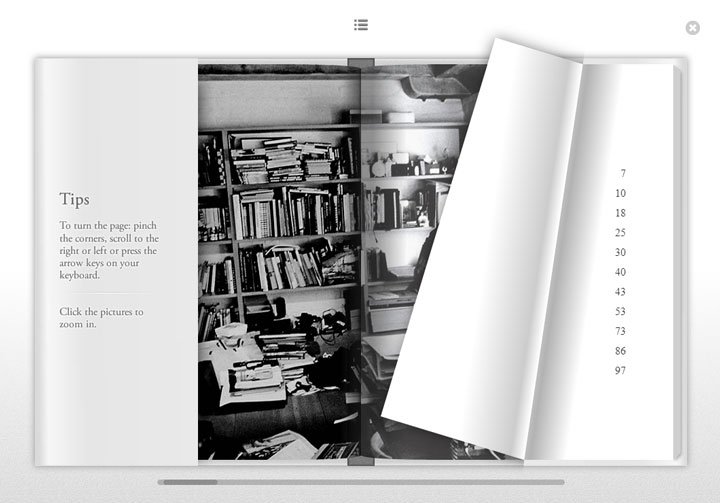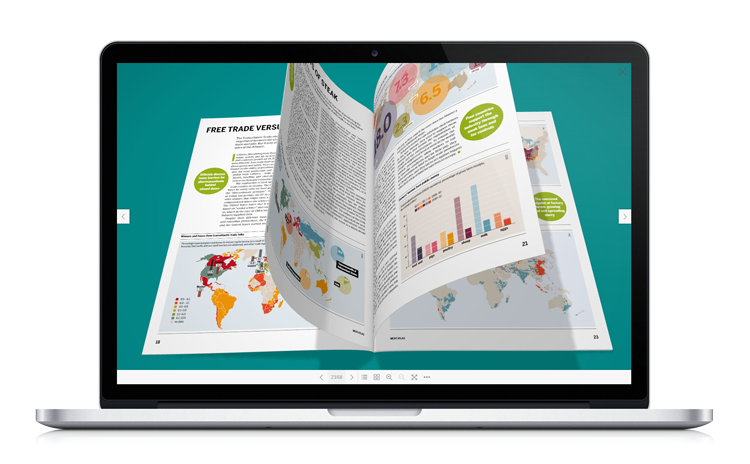Turn.js has been a widely accessible JavaScript flipbook solution, highly valued by developers for its simplicity and effectiveness. Despite being released under a non-commercial BSD license, Turn.js has garnered a significant user base, largely due to its open-source nature and public availability on GitHub. This visibility has made it a go-to resource for developers looking to implement flipbook functionality in their projects.
Turn.js has played a crucial role in the flipbook sector by providing a straightforward and efficient way to convert content into interactive, book-like experiences. It has been particularly instrumental in helping developers grasp the basics of creating flipbooks, streamlining the initial implementation process. The library’s ease of use and comprehensive documentation have made it a benchmark tool in the flipbook industry, influencing many subsequent solutions.

However Turn.js has shown it’s age recently, due to many factors. These are some disadvantages of turn.js.
- The repository for Turn.js has not seen any updates for more than 12 years, giving it the appearance of an abandoned project. Although version 4.0 is available, it now requires a commercial license and can only be accessed through turnjs.com. It is understandable that, after a long period, an open-source library may transition towards a commercial model. Turn.js has followed this path as well.
- Initially, Turn.js was developed to support HTML and image content. While these formats are relatively straightforward to use, they are not as convenient as PDF documents, which are commonly utilized by many publications. To incorporate PDF documents into Turn.js, users need to first convert them into images, adding an extra layer of complexity.
- Furthermore, many newer flipbook solutions offer a more immersive 3D look and feel, a feature that Turn.js lacks. With the decline of Flash, technologies such as HTML5 Canvas and WebGL have become standard in modern browsers. Leveraging these technologies, contemporary 3D flipbooks deliver more realistic and engaging user experiences, contributing to their increasing popularity in modern web development landscapes.
The Best JavaScript Alternative To Turn.js:DearFlip
While Turn.js has proven to be a capable flipbook solution, the landscape for such tools is rich with competition and alternatives. Various other flipbook solutions cater to the needs of a wide array of publications, offering advanced features and usability enhancements.
Publications often include their monthly magazines and ebooks directly on their websites, making digital flipbooks an essential tool for delivering content. Flipbooks excel in providing an immersive reading experience that closely mimics the act of reading a physical book or magazine. This tactile experience is crucial as it engages readers more effectively than static HTML or PDF documents alone.
Some of these advanced flipbook solutions go further by incorporating interactive elements and realistic animations, giving the user the sensation of flipping the pages of a real book. These features can include 3D page-turning effects, customizable layouts, multimedia integration (such as videos and audio), and even support for responsive design to ensure compatibility across various devices and screen sizes.
In an era where user experience is paramount, the ability of modern flipbooks to offer a near-authentic reading experience makes them invaluable for digital publications. As technology evolves, the competition in the flipbook space continues to drive innovation, offering increasingly sophisticated solutions that enhance both the aesthetic and functional aspects of digital reading.
DearFlip is ideal for: magazines, eBooks, photo albums, reports, brochures, educational resources, catalogs, and professional portfolios.

HTML documents vs PDF?
DearFlip supports both image files and PDF formats, offering flexibility for creating digital flipbooks. Unlike Turn.js, which relies on HTML and requires advanced knowledge to set up and maintain, DearFlip makes it easy to produce visually appealing flipbooks without extensive technical skills.
With Turn.js, users must carefully manage HTML pages and CSS to ensure proper display on both desktop and mobile devices. PDFs, in contrast, are simpler to create and maintain, providing a streamlined workflow for digital publications.
Creating PDFs is straightforward and often requires only a basic word processor. For example, writing a novel or designing a magazine would involve generating individual HTML pages for each page if using Turn.js—a time-consuming and complex process. PDFs, however, can be exported from virtually any word processor, making them a universal, reliable, and widely recognized format.
Because of these advantages, DearFlip recommends using PDFs over image files. PDFs simplify the creation and maintenance of digital flipbooks, enabling a faster, more efficient workflow. This makes DearFlip an ideal choice for users looking to produce high-quality, responsive digital publications with minimal effort.
PDFs are simple to create, easy to maintain, and fully compatible across all devices.
DearFlip is a powerful tool for creating digital versions of publications such as magazines, eBooks, photo albums, reports, and more. It acts as a virtual equivalent of traditional books and magazines, providing readers with an engaging and interactive experience that closely replicates the feeling of flipping through a physical publication. This makes DearFlip perfect for anyone looking to present content in a visually appealing and user-friendly digital format.
As a versatile flipbook solution, DearFlip excels in delivering rich, interactive reading experiences across a wide range of publication types. Below, we explore its suitability and advantages for different kinds of content.
Magazines
DearFlip provides a realistic digital reading experience for magazines, closely simulating the feel of flipping through a physical copy. Its powerful rendering engine handles high-resolution images and text effortlessly, ensuring crisp and clear visuals.
The platform supports interactive features such as embedded videos, clickable links, and forms, allowing publishers to create engaging, multimedia-rich layouts. With a fully responsive design, digital magazines display perfectly on all devices—from desktops to tablets and smartphones—offering a consistent and immersive reading experience for every user.
Ebooks
DearFlip is ideal for ebooks, converting static PDFs or text files into interactive flipbook formats. This transformation boosts reader engagement and provides an intuitive navigation system for easily browsing chapters and sections.
Ebook creators can enhance their content with multimedia elements, annotations, and interactive footnotes, offering a richer and more engaging reading experience. Additionally, DearFlip supports multiple languages and right-to-left text, making it a versatile solution for publishers targeting a global audience.
Photo Albums
DearFlip transforms photo albums into interactive digital experiences, replicating the feel of flipping through a real album. Its high-resolution image rendering ensures that every photo is displayed with sharpness and vivid detail.
Users can zoom in on pictures, add captions, and include personalized notes. The option to integrate background music and sound effects adds an extra layer of emotion to the viewing experience. DearFlip is perfect for family albums, travel journals, and professional portfolios, offering a rich set of features to enhance photo storytelling.
Reports and Brochures
DearFlip is an ideal solution for showcasing business reports and marketing brochures in a visually engaging and easy-to-read format. Its interactive features allow embedding charts, graphs, and call-to-action buttons, making it perfect for corporate presentations, client communications, and promotional materials.
Educational Materials
DearFlip is a powerful tool for creating interactive educational resources. It can turn textbooks, study guides, and research papers into engaging flipbooks that enhance learning. Features such as searchable text, interactive quizzes, and embedded multimedia make studying more dynamic and help students interact with the material more effectively.
Catalogs and Portfolios
DearFlip enables artists, designers, and retailers to transform catalogs and portfolios into interactive digital showcases. With high-resolution images, detailed descriptions, and direct shopping links, digital catalogs become engaging tools that capture attention, boost user interaction, and drive sales.
Key Features
- Realistic 3D Page-Turning Effects: Provides a lifelike experience similar to flipping real pages.
- Multimedia Integration: Supports embedding videos, audio, and other interactive elements.
- Responsive Design: Optimized for seamless viewing across desktops, tablets, and smartphones.
- High-Resolution Rendering: Ensures images and text remain crisp and clear.
- Customizable Layouts: Easily tailor the design to match your brand identity.
Conclusion
DearFlip is a versatile and powerful tool for enhancing a wide range of digital publications. By combining visual appeal with interactive functionality, it transforms magazines, ebooks, photo albums, business reports, and more into engaging flipbook experiences. Whether for professional, educational, or personal use, DearFlip provides a comprehensive solution for creating interactive and visually striking digital content.

All DearFlip comments and discussion have been moved to
https://github.com/dearhive/dearflip-js-flipbook/discussions